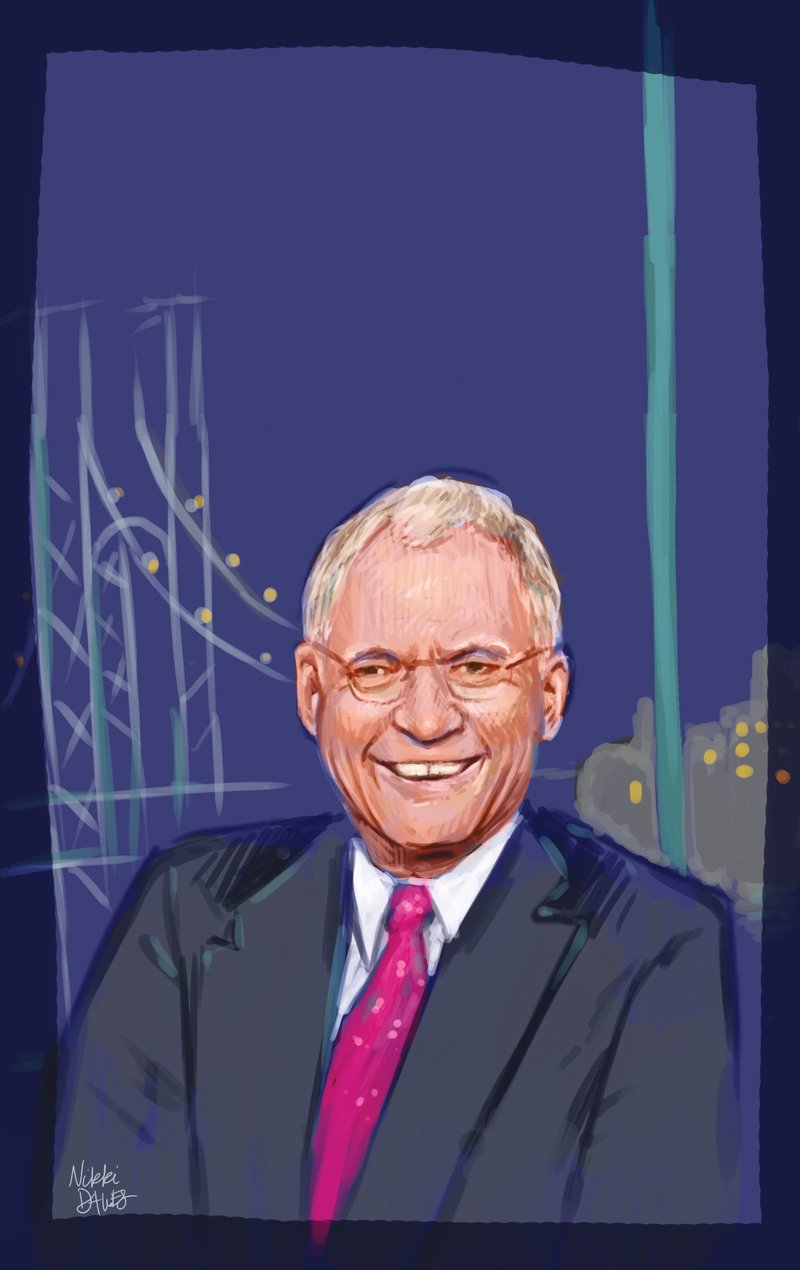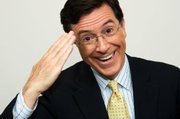It was a typical week for late-night television: On NBC's Tonight show, the host, Jimmy Fallon, played a catchphrase guessing game with Modern Family star Sofia Vergara, and re-enacted the music video for the 1990 rock ballad More Than Words.
On ABC's Jimmy Kimmel Live, Jimmy Kimmel watched a hidden camera to see how Los Angeles pedestrians would react to a burrito dangled above Hollywood Boulevard. And on CBS' Late Late Show, James Corden asked pizzeria customers to choose between the pies they had ordered and the contents of a mystery box.
Elsewhere, on CBS' Late Show, David Letterman was interviewing President Barack Obama -- a ruminative, sometimes funny, casual conversation between two men who seemed almost like peers, joking about how they might share a game of dominoes after they retire.
Letterman, of course, will make that transition first: He is ending his 22-year run on Late Show (and a 33-year late-night career) Wednesday.
When he walks out of the famously chilly Ed Sullivan Theater for the last time, he will be leaving a late-night landscape that while brimming with
potential and still attracting millions of viewers, is also scrambling to redefine itself in a world where late-night TV shows are increasingly not being watched at night, not for more than a few minutes and not on a TV.
If Letterman represented an era when a late-night show was a comprehensive end-of-day viewing experience, meant to be watched in a post-twilight setting for a full hour (or until you fell asleep), the coming age is fragmented by technology, designed for online virality, unstructured and unmoored from any time slots.
"People are just plucking your greatest hits, without having to sit through the rest of the show," says Kimmel, 47, the ABC host. "There's more focus on singles than on albums."
Many of the classic trappings of late-night shows are still visible: opening monologues, house bands and desk-side celebrity chitchats. What is going away is the expectation that viewers will watch these programs in close to their entirety, or even sequentially.
And future shows will abandon the familiar, rhythmic tempo of late night altogether. Next year, Chelsea Handler, the former host of the E! series Chelsea Lately, plans to introduce a Netflix series that can be watched at any time of day and whose contents could vary widely from episode to episode. (Handler, like Trevor Noah, who will replace Jon Stewart on The Daily Show, has yet to appear on the air in a new late-night hosting role.)
...
In the meantime, the people currently creating late-night television are experiencing varying degrees of head-scratching and hand-wringing and periods of Internet sniping as they try to determine how to distinguish their programs.
Seth Meyers, who hosts NBC's Late Night, observes that nearly every comedy component that was once unique to the field has been co-opted elsewhere, but each performer can still find a signature element to stand out in the crowd.
Asked if topical competitors like The Daily Show had taken away some of his opening-monologue turf, Meyers, 41, replies, "Certainly."
He adds: "Someone has the market cornered on everything, but no one has a monopoly on everything. I'd like to have a show that is good at a lot of different things, as opposed to just one thing."
In a positive development for these shows, the Internet has allowed them to reach larger audiences while their broadcast ratings remain healthy.
Fallon, 40, has nearly 4 million nightly viewers, while Kimmel and Letterman get about 2.7 million each. (These numbers are down overall from earlier, less fragmented eras -- Jay Leno's Tonight show drew about 6 million viewers and Letterman's Late Show about 4 million when they went head-to-head in the 2000s.)
A successful online video from one of those shows, however, can be even more powerful. A reunion of the Saved by the Bell cast or a woman appearing to set herself aflame while attempting to twerk can receive tens of millions of views.
Fallon's recurring celebrity lip-sync competitions are popular enough to have spawned a hit spinoff series, Lip Sync Battle, on the Spike cable channel.
Still, there is concern that pursuing online virality for its own sake will backfire.
"You cannot be chasing that, because it's futile," says Corden, 36, the British actor who took over Late Late Show in March.
"If you just want to have a great viral clip," he adds, "I'll strip naked and run down Sunset Boulevard. That will get loads of views."
Others have criticized the use of these offbeat segments for creating an overly clubby sensibility. In April, Andres du Bouchet, a writer for TBS' Conan, criticized other programs for an overreliance on gimmickry he called "Prom King Comedy."
"No celebrities, no parodies, no pranks, no mash-ups or hashtag wars," du Bouchet wrote in a series of tweets that were later deleted.
"You've let the popular kids appropriate the very art form that helped you deal," he wrote. "None of the funniest stuff ever involved celebrity cameos."
Du Bouchet, who appears to be attacking rival hosts like Fallon, was reprimanded by his own boss. Conan O'Brien, the former Late Night and Tonight show host, tweeted that one of his writers should "focus on making my show funnier instead of tweeting stupid things about the state of late-night comedy."
Through their press representatives, Fallon, O'Brien and their staffs declined to comment for this article.
Kimmel, without naming names, says this debate reflects "a stupid way of looking at things."
"Should we force guests to sit in their chairs and only talk?" he says. "People are not allowed to get up and perform? These are variety shows, and there's more variety than there ever was before."
That evolution is as much a result of shifts in the talents of the people leading these programs as in technology. Where Letterman broke in as a stand-up comic and O'Brien as a TV comedy writer, hosts like Fallon and Corden are more seasoned and dynamic performers.
Stephen Colbert, 50, who played an acerbic political commentator on The Colbert Report on Comedy Central, will set aside this character when he takes over at Late Show in September. Prospective writers for his Late Show have been told the host still enjoys "active and silly comedy," according to a set of submission guidelines these writers were provided, and have been asked to pitch jokes based on news stories as well as comedy bits he can perform with guests.
Letterman, whose Late Night program on NBC provided a cutting-edge companion to Johnny Carson's Tonight show in the '80s, was welcoming of this latest wave of change.
Going back to the creation of the Tonight show in 1954, Letterman says, "If you take a look at early Steve Allen shows, I'll bet you could find versions of what is now being done -- maybe not as slick, certainly not in color."
Letterman says the seeds of change "were sown decades ago, and good for these guys, that they found something else to do."
Merrill Markoe, Letterman's original head writer at Late Night, says that many of its comic creations -- top 10 lists; Velcro suits; hydraulic-press experiments -- were a response at the time to the perceived rigidity of Carson's show. The challenge she and her colleagues faced, she says, was to "bring something new to the landscape," which she says is "still the job definition."
Inevitably, for every late-night era, what once seemed daring and unfamiliar will someday become the tradition for the next generation to push against.
"Over 20 years ago, we said goodbye to Carson," says Nell Scovell, a former writer for Letterman's Late Night program.
"This month, we'll say goodbye to Letterman," she adds. "And 20 years from now, we'll all lip-sync goodbye to Jimmy Fallon."
Style on 05/19/2015


